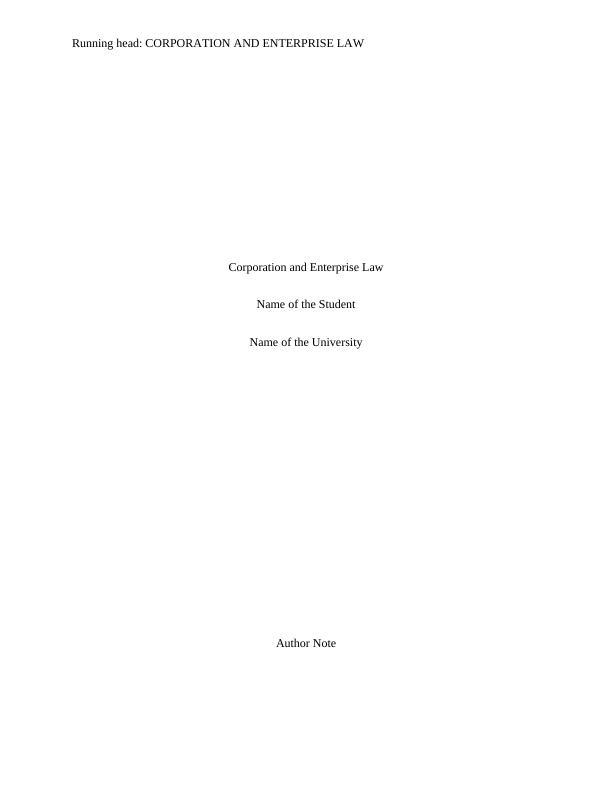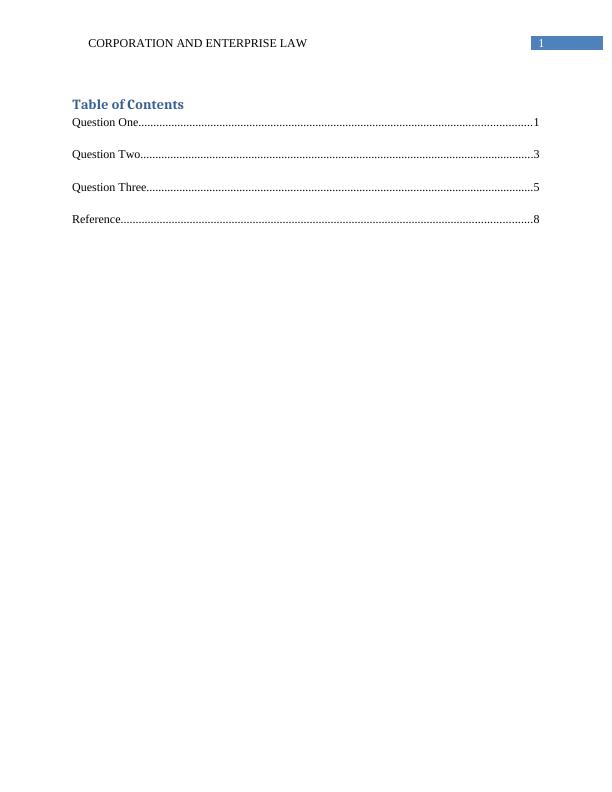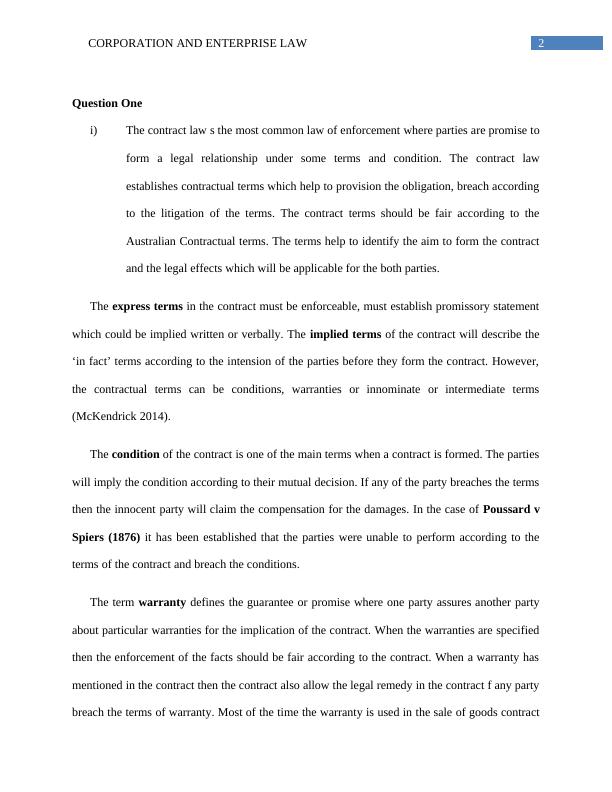Corporation and Enterprise Law
Added on 2020-03-02
11 Pages2447 Words52 Views
Running head: CORPORATION AND ENTERPRISE LAWCorporation and Enterprise LawName of the StudentName of the UniversityAuthor Note

1CORPORATION AND ENTERPRISE LAWTable of ContentsQuestion One...................................................................................................................................1Question Two...................................................................................................................................3Question Three.................................................................................................................................5Reference.........................................................................................................................................8

2CORPORATION AND ENTERPRISE LAWQuestion One i)The contract law s the most common law of enforcement where parties are promise toform a legal relationship under some terms and condition. The contract lawestablishes contractual terms which help to provision the obligation, breach accordingto the litigation of the terms. The contract terms should be fair according to theAustralian Contractual terms. The terms help to identify the aim to form the contractand the legal effects which will be applicable for the both parties.The express terms in the contract must be enforceable, must establish promissory statementwhich could be implied written or verbally. The implied terms of the contract will describe the‘in fact’ terms according to the intension of the parties before they form the contract. However,the contractual terms can be conditions, warranties or innominate or intermediate terms(McKendrick 2014). The condition of the contract is one of the main terms when a contract is formed. The partieswill imply the condition according to their mutual decision. If any of the party breaches the termsthen the innocent party will claim the compensation for the damages. In the case of Poussard vSpiers (1876) it has been established that the parties were unable to perform according to theterms of the contract and breach the conditions.The term warranty defines the guarantee or promise where one party assures another partyabout particular warranties for the implication of the contract. When the warranties are specifiedthen the enforcement of the facts should be fair according to the contract. When a warranty hasmentioned in the contract then the contract also allow the legal remedy in the contract f any partybreach the terms of warranty. Most of the time the warranty is used in the sale of goods contract

3CORPORATION AND ENTERPRISE LAWterms regarding the supply of the goods. If any of the term has breached then the consumer willtake legal actions against the supplier. In the case of Clark v Macourt [2013] it has been foundthat the aggrieve party has breach the warranty terms when the seller sale the products to thebuyer. Therefore the buyer has awarded with compensation (McKendrick 2014). The intermediate terms are also the concept of the breach of the terms in the contract. Whenthe aggrieve party has rights to terminate the contract as per some consequences and severity ofthe breach. If the innocent party find the seriousness terms in the contract for the breach then hehas right to take legal actions against the aggrieve party. If again the cause has been performed infuture then the party claims the compensation for the damages. The implied terms are essential for the formation of contract where it establishes the clausesfor the termination of the contract. When the terms are applied against the nature of the rulesthen the contract can be terminated. When the promisee make the assurance about the strict orsubstantial performance of the promise in the contract then the contract can be terminated. Theabsence of the terms could be the reason for the termination. Therefore all of the terms give theprovision for the innocent party to terminate the contract for the breach of the terms by theaggrieved party. ii)According to the contract law the contract only terminated when the consequences ofthe conditions has been breached. The promise of only establishes when the promiseeassured about strict a substantial performance which is apparent to the promisor. Theconsequences of the warranty oily applicable for the breach the terms. However,according to the contract law the parties can terminate the contract if there is anyimportant reason has been established by the aggrieve party. The intermediate or in

End of preview
Want to access all the pages? Upload your documents or become a member.
Related Documents
Conditions and Warranties in Australian Contract Lawlg...
|10
|2762
|265
Contractual Rights and Obligations - Assignmentlg...
|5
|1488
|85
Legal Institutions Assignment Solutionlg...
|10
|1823
|39
BUSINESS AND CORPORATION LAW.lg...
|9
|2249
|152
LAW504 Business and Corporations Lawlg...
|9
|2143
|146
Business Law: Contract Terms and Australian Consumer Lawlg...
|8
|1985
|143
